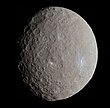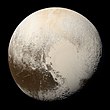54598 Bienor
Appearance
| Discovery | |
|---|---|
| Discovered by | DES |
| Discovery site | Cerro Tololo Obs. |
| Discovery date | 27 August 2000 |
| Designations | |
| (54598) Bienor | |
| Pronunciation | /baɪˈiːnɔːr/[1] |
Named after | Biēnor |
| 2000 QC243 | |
| Centaur [2] | |
| Adjectives | Bienorian /baɪ.ɪˈnɔːriən/ |
| Orbital characteristics [2] | |
| Epoch 31 May 2020 (JD 2459000.5) | |
| Uncertainty parameter 0 | |
| Observation arc | 24775 days (67.83 yr) |
| Aphelion | 19.715 AU (2.9493 Tm) |
| Perihelion | 13.172 AU (1.9705 Tm) |
| 16.444 AU (2.4600 Tm) | |
| Eccentricity | 0.19894 |
| 66.68 yr (24355 d) | |
Average orbital speed | 7.26 km/s |
| 318.473° | |
| 0° 0m 53.039s / day | |
| Inclination | 20.745° |
| 337.728° | |
| 153.374° | |
| Earth MOID | 12.199 AU (1.8249 Tm) |
| Jupiter MOID | 7.873 AU (1.1778 Tm) |
| TJupiter | 3.575 |
| Physical characteristics | |
| 187.5±15.5 km[3] 198 km[4] 207±30 km[5] | |
| 9.14 h (0.381 d)[2] | |
| 0.03–0.05[5] 0.05±0.019[3] | |
| Temperature | ~ 69 K |
| BR[4] B–V = 0.711±0.059[6] V–R = 0.476±0.046[6] | |
| ~ 19.2[7] | |
| 7.5[2] | |
54598 Bienor /baɪˈiːnɔːr/ is a centaur that grazes the orbit of Uranus. It is named after the mythological centaur Bienor. Its closest approach to the Sun (perihelion) is 13.2 AU.[2] As of 2020[update], Bienor is 14.2 AU from the Sun[7] and will reach perihelion in January 2028.[2] It measured approximately 198 kilometers (120 miles) in diameter.[4]
See also
References
- ^ Noah Webster (1884) A Practical Dictionary of the English Language
- ^ a b c d e f "JPL Small-Body Database Browser: 54598 Bienor (2000 QC243)" (2020-11-11 last obs). Jet Propulsion Laboratory. Retrieved 20 December 2020.
- ^ a b Bauer, J. M.; Grav, T.; Blauvelt, E.; Mainzer, A. K. (August 2013). "Centaurs and Scattered Disk Objects in the Thermal Infrared: Analysis of WISE/NEOWISE Observations". The Astrophysical Journal. 773 (1): 11. arXiv:1306.1862. Bibcode:2013ApJ...773...22B. doi:10.1088/0004-637X/773/1/22. S2CID 51139703.
- ^ a b c Johnston, Wm. Robert (18 August 2020). "List of Known Trans-Neptunian Objects". Johnston's Archive. Retrieved 12 August 2021.
- ^ a b Stansberry, J.; Grundy, W.; Brown, M.; Cruikshank, D. (20 February 2007). "Physical Properties of Kuiper Belt and Centaur Objects: Constraints from Spitzer Space Telescope". arXiv:astro-ph/0702538.
{{cite journal}}: Cite journal requires|journal=(help) - ^ a b Hainaut, O. R.; Boehnhardt, H.; Protopapa, S. (October 2012). "Colours of minor bodies in the outer solar system. II. A statistical analysis revisited". Astronomy and Astrophysics. 546: 20. arXiv:1209.1896. Bibcode:2012A&A...546A.115H. doi:10.1051/0004-6361/201219566. S2CID 54776793. Retrieved 26 September 2019.
- ^ a b "AstDyS (54598) Bienor Ephemerides". Department of Mathematics, University of Pisa, Italy. Retrieved 20 December 2020.
External links
- 54598 Bienor at AstDyS-2, Asteroids—Dynamic Site
- 54598 Bienor at the JPL Small-Body Database
- 1953 precovery image by the Palomar Observatory Sky Survey (Bienor is the object at the centre).



